高考英语复习:动词不定式讲解与练习(含答案解析)
最新高二英语动词不定式专题讲解与强化练习(带答案很实用!)

英语语法(动词不定式)定义:动词不定式是一种非限制动词形式,即非谓语动词。
非限定动词是指不能单独在句中充当谓语的动词形式。
非谓语动词包括:动词不定式,-ing分词和-ed分词。
动词不定式在语法功能上可作主语、宾语、表语、定语和状语。
不定式的用法1)不定式结构作主语1. To finish that task in such a short time is really a challenge.在上述情况下,如果不定式较长,显得头重脚轻,则可由it作形式主语,而将不定式放到后面。
如:1.It made him happy to get 100yuan by his own effort.2.3It's… for sb to do.和It's … of sb to do.1)of sb句型中的形容词一般为表示性格,品德,心智能力,表示主观感情或态度的形容词,如careless,clever,considerate,foolish,good,impolite,kind,naughty,nice,silly,stupid。
例如:It's very nice of you to help me. 你来帮助我,你真是太好了。
用for还是用of 的另一种辨别方法:用介词for或of后面的逻辑主语作句子的主语,用介词前边的形容词作表语,造个句子。
如果通顺用of,不通则用for。
例如:You are nice.(通顺,所以应用of)。
He is hard.(非所表达的意思,不通,因此用for。
)2)for sb. 句型中的形容词一般为表示事物的特征特点,表示客观形式的形容词,如easy, hard, difficult, interesting, impossible等:例如:It's very h ard for him to study two languages. 对他来说学两门外语是很难的。
高考英语不定式语法复习(真题+讲解)
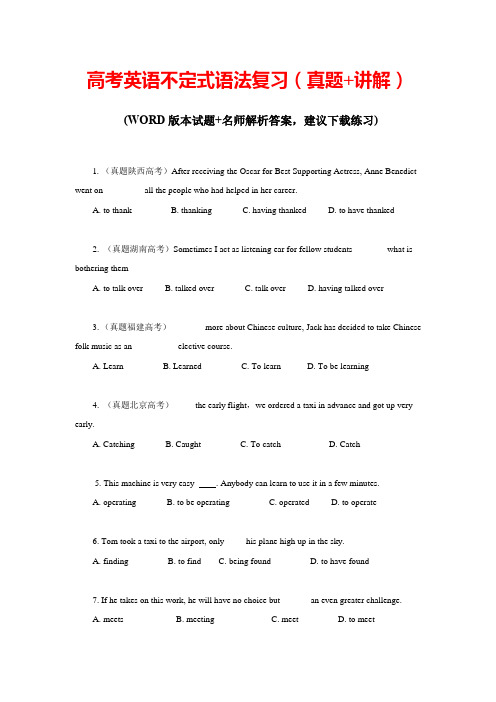
高考英语不定式语法复习(真题+讲解)(WORD版本试题+名师解析答案,建议下载练习)1.(真题陕西高考)After receiving the Oscar for Best Supporting Actress, Anne Benedict went on _________all the people who had helped in her career.A. to thankB. thankingC. having thankedD. to have thanked2. (真题湖南高考)Sometimes I act as listening ear for fellow students _______ what is bothering themA. to talk overB. talked overC. talk overD. having talked over3. (真题福建高考)________ more about Chinese culture, Jack has decided to take Chinese folk music as an elective course.A. LearnB. LearnedC. To learnD. To be learning4. (真题北京高考)_____the early flight,we ordered a taxi in advance and got up very early.A. CatchingB. CaughtC. To catchD. CatchA. operatingB. to be operatingC. operatedD. to operate6. Tom took a taxi to the airport, only ____ his plane high up in the sky.A. findingB. to findC. being foundD. to have found7. If he takes on this work, he will have no choice but ______ an even greater challenge.A. meetsB. meetingC. meetD. to meet8. Birds’ singing is sometimes a warning to other birds ________ away.A. to stayB. stayingC. stayedD. stay9. George returned after the war, only _______ that his wife had left him.A. to be toldB. tellingC. being toldD. told10.No matter how bright a talker you are, there are times when it's betterA. remainB. be remainingC. having remainedD. to remainA. lockingB. to lockC. having lockedD. to have locked答案与解析1. A。
高中英语 动词不定式专项讲解及训练(有答案)
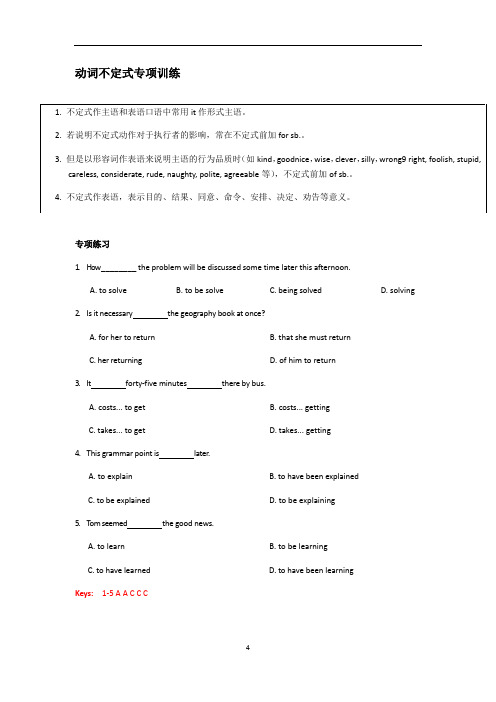
动词不定式专项训练A. to solveB. to be solveC. being solvedD. solvingA. for her to returnB. that she must returnC. her returningD. of him to returnA. costs... to getB. costs... gettingC. takes... to getD. takes... gettingA. to explainB. to have been explainedC. to be explainedD. to be explainingA. to learnB. to be learningC. to have learnedD. to have been learningKeys: 1-5 A A C C C专项练习1.The flu is believed_______ by viruses that like to reproduce in the cells inside the human nose and throat.A. causingB. being causedC. to be causedD. to have been caused2.There is a new problem involved in the popularity of private cars road conditions needA. that. .. to be improvedB. which ... to be improvedC. where. . . to be improvingD. when.. . improving3.Remember_________the magazine when you have finished reading it.A. putting backB. having put backC. to put backD. will put back4.—I'm sorry I forgot________ your dictionary.—Let's use Li Hua's.A. to takeB. takingC. to bringD. bringingA. to do whatB. what to doC. doing whatD. what doingA. writing... phoningB. to write. . . to phoneC. writing... to phoneD. to write. . . phoning7.Tom is always forgetting things he has done. Yesterday, he forgot and looked for it eve-rywhere.A. to post the letterB. to have the letter postedC. to having posted the letterD. having posted the letterA. to be notB. not to beC. not beingD. being not9.My brother regretted _______ a lecture given by Prof. Wang.A. missingB. to missC. missedD. being missing10.I regret _______ you that we are unable to offer you a job.A. informingB. having informedC. to informD. to informing11.He felt tired with typing the lecture. So he stopped_______ a short break.A. havingB. to haveC. takingD. to taking12.In order to gain a bigger share in the international market, many state-run companies arestriving their products more competitive.A. to makeB. makingC. to have madeD. having madeA. to sit... weptB. to sit. .. weepingC. sit... weptD. sat. . . weeping14.—You have come just in time tohelp us.—Fine. What needs________________________?A. I doB. doneC. to be doneD. to do15.That evening, he set about_________ t he report_______ the next morning.A. write... to hand inB. to write.. . handing inC. written... to hand inD. writing... to be handed in16.There seemed nothing ________ to do but ________ f or the doctor.A. leave... sendB. left... to sendC. left... sendD. leaving... send17.Do you think it difficult________ a dolphin ________ ?A. to train... jumpingB. training... for jumpingC. to train... jumpD. to train... to jump18.I prefer _______ rather than_______ .A. to do some reading... watching TVB. doing some reading... watching TVC. to do some reading... watch TVD. doing some reading... to watch TV19.The two boys pretended _________ v ery hard, though they did nothing.A. studyB. studyingC. to be studiedD. to be studying Keys: 1-5 CACCB6-10 CDBAC 11-15 BAB CD 16-19CDCD专项练习1.An army spokesman stressed that all the soldiers had been ordered clear warnings before firing any shots.A. to issueB. being issuedC. to have issuedD. to beissuedA. practise to singB. practise singingC. to practise to singD. to practise singing3.—What can we do to help Li Ming?A. making him to realizeB. making him realizeC. to make him realizeD. to make him to realizeA. disappearB. to disappearC. disappearingD. disappearedA. to writeB. writtenC. writeD. writingA. madeB. to makeC. makingD. to be makingA. saysB. sayingC. sayD. saidA. give upB. giving upC. to give upD. to giving upA. to commentB. commentC. to commentingD. being commentedA. reciteB. recitedC. recitingD. to reciteA. repeat the question againB. repeating the questionC. to repeating the questionD. to repeat the questionA. to be destroyedB. to have been destroyedC. to be destroyingD. to have been destroyingA. to go alongB. going alongC. went alongD. will goalongA. to get it to startB. get it startD. getting it startedC. to get it startedA. to sweepB. to be sweptC. should sweepD. being swept Keys:1-5 ADC AC6-10 CCCBA 11-15 DBACB1.—I'd like to buy a car made in Shanghai.—Okay, Sir. You have several models ________ .A. to chooseB. to be chosen fromC. to choose fromD. for choosing2.It's time________ rice.A. for transplantB. of transplantingC. to transplantD. to transplanting3.It is a very difficult problem. I need a few days_________ .A. of thinking over itB. to think it overC. of thinking it overD. to think over it4.People need homes _______ and food ________ .A. to live... to eatB. to live in... to eatC. live. . . to eatD. to live in... to eat for5.Columbus was the first _________ t he New Continent.A. to have discoveredB. to discoverC. discoveringD. having discovered Keys:1-5 CCBBB专项练习A. for the family to liveB. for the family to live inC. that the family can't live inD. that the family can't liveA. so everyone to understandB. for every one understoodC. for everyone to understandD. for understandingA. to get along withB. to get alongC. to be got along withD. to getting along withA. for us in followingB. for us to be followedC. to be followedD. for us to followA. to drink itB. to be drunkC. to drinkD. to be drinkingA. to seeB. for to seeC. for seeingD. seeing7. _______ , I don't want to argue with them about the matter.A. To tell you the truthB. Telling the truthC. Having told you the truthD. Out of the truthA. to not frightenB. so as not to frightenC. in order to not frightenD. for not frighteningA. showing me the wayB. as to show me the wayC. to show me the wayD. so you can show me the wayA. to leaveB. that he leavesC. as to leaveD. leavingKeys:1-5 BCADC6-10 AABCC专项练习vi. 不定式的时态与语态意义1. 不定式的时态意义1)一般式:不定式的动作与谓语动词的动作同时发生或是在其后发生。
高中英语语法非谓语动词之动词不定式讲解及习题
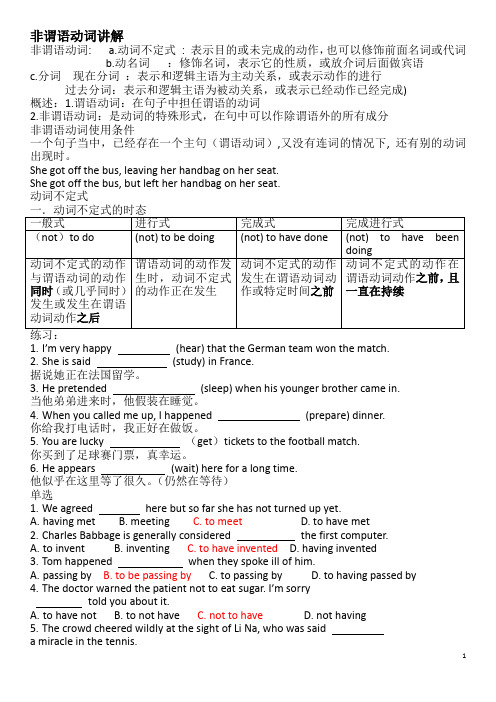
非谓语动词讲解非谓语动词: a.动词不定式: 表示目的或未完成的动作,也可以修饰前面名词或代词b.动名词:修饰名词,表示它的性质,或放介词后面做宾语c.分词现在分词:表示和逻辑主语为主动关系,或表示动作的进行过去分词:表示和逻辑主语为被动关系,或表示已经动作已经完成)概述:1.谓语动词:在句子中担任谓语的动词2.非谓语动词:是动词的特殊形式,在句中可以作除谓语外的所有成分非谓语动词使用条件一个句子当中,已经存在一个主句(谓语动词),又没有连词的情况下, 还有别的动词出现时。
She got off the bus, leaving her handbag on her seat.She got off the bus, but left her handbag on her seat.动词不定式一.动词不定式的时态一般式进行式完成式完成进行式(not)to do (not) to be doing (not) to have done (not) to have beendoing动词不定式的动作与谓语动词的动作同时(或几乎同时)发生或发生在谓语动词动作之后谓语动词的动作发生时,动词不定式的动作正在发生动词不定式的动作发生在谓语动词动作或特定时间之前动词不定式的动作在谓语动词动作之前,且一直在持续练习:1.I’m very happy (hear) that the German team won the match.2.She is said (study) in France.据说她正在法国留学。
3.He pretended (sleep) when his younger brother came in.当他弟弟进来时,他假装在睡觉。
4.When you called me up, I happened (prepare) dinner.你给我打电话时,我正好在做饭。
5.You are lucky (get)tickets to the football match.你买到了足球赛门票,真幸运。
动词不定式归纳(含练习及答案)
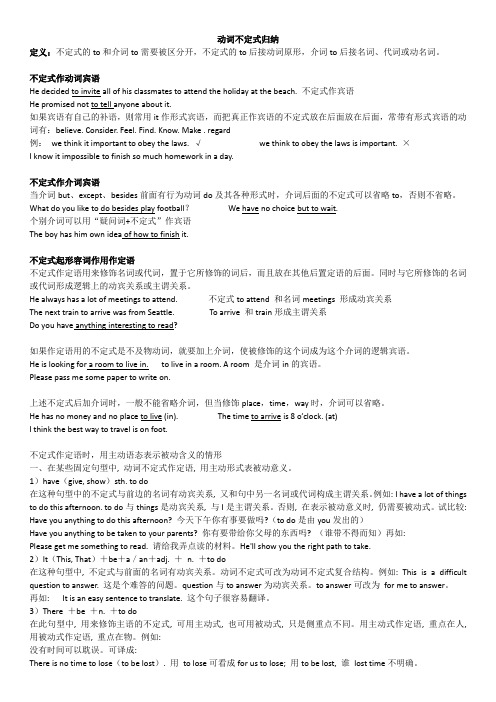
动词不定式归纳定义:不定式的to和介词to需要被区分开,不定式的to后接动词原形,介词to后接名词、代词或动名词。
不定式作动词宾语He decided to invite all of his classmates to attend the holiday at the beach. 不定式作宾语He promised not to tell anyone about it.如果宾语有自己的补语,则常用it作形式宾语,而把真正作宾语的不定式放在后面放在后面,常带有形式宾语的动词有:believe. Consider. Feel. Find. Know. Make . regard例:we think it important to obey the laws. √we think to obey the laws is important. ×I know it impossible to finish so much homework in a day.不定式作介词宾语当介词but、except、besides前面有行为动词do及其各种形式时,介词后面的不定式可以省略to,否则不省略。
What do you like to do besides play football?We have no choice but to wait.个别介词可以用“疑问词+不定式”作宾语The boy has him own idea of how to finish it.不定式起形容词作用作定语不定式作定语用来修饰名词或代词,置于它所修饰的词后,而且放在其他后置定语的后面。
同时与它所修饰的名词或代词形成逻辑上的动宾关系或主谓关系。
He always has a lot of meetings to attend. 不定式to attend 和名词meetings 形成动宾关系The next train to arrive was from Seattle. To arrive 和train形成主谓关系Do you have anything interesting to read?如果作定语用的不定式是不及物动词,就要加上介词,使被修饰的这个词成为这个介词的逻辑宾语。
动词不定式用法全解(含测试题及答案)

动词不定式用法全解英语动词的非谓语形式为三种:动词不定式、动名词和分词。
非谓语动词没有人称和数的变化。
动词不定式是一种非谓语动词形式,其结构为“to+动词原形”,其中to不是介词,而是动词不定式的符号,称为小品词,动词不定式没有人称和数的变化。
动词不定式和其后面的名词等构成不定式短语,在句子中可以用作主语、表语、宾语、补足语、定语、状语等。
动词不定式的形式:第一部分动词不定式的时态一、动词不定式的时态:动词不定式不能在句中作谓语,尽管它本身有时态的变化,但是却不能靠自身的变化形式表示动作发生的具体时间。
动词不定式发生的时间,一般只能根据谓语动词的时间,产生相对的先后时间关系。
1.不定式的一般式,表示不定式的动作与谓语动词动作几乎同时发生,或在谓语动作之后发生,或者不强调不定式动作的时间性。
但不定式表原因时,往往先于谓语动作之前发生。
如:The news will not fail to surprise him.这个消息将不会不使他大吃一惊的。
(不定式动作在将来和谓语动作同时发生)I helped to repair the car.我帮助修理汽车。
(不定式动作在过去与谓语动作同时发生)He didn't know where to go.他不知道该去哪儿。
(不定式稍晚于谓语动作)Tell your brother not to come tomorrow.告诉你哥哥明天不要来。
(不定式晚于谓语动作)判断:He decided to sell his car.I tried to go to school in time.I hope to see you soon不定式表示谓语动作的原因时,往往发生在谓语动作之前。
如:I am very happy to see you here.She seemed surprised to meet us.(先是遇见我们,她然后很吃惊)2.不定式的完成式,通常表示动作发生在谓语动词之前。
(完整版)高中英语语法复习讲义+训练:动词不定式(含答案),推荐文档

高中英语语法复习讲义——动词不定式一.相关知识点精讲:1.不定式作补语1)有些有动词+宾语+不定式的结构。
例如:例如;Father will not allow us to play on the street. 父亲不让我们在街上玩耍。
The officer ordered his men to fire. 长官命令士兵开火。
注意:有些动词如make,have,get,want 等可用不定式作做宾补,也可用分词作宾补。
现在分词表达主动,也表达正在进行,过去分词表达被动。
2)有些有动词+宾语+不定式的结构,不定式的动词往往是be,不定式一般可以省去。
例如:例如:We believe him to be guilty. 我们相信他是有罪的。
We know him to be a fool. 我们知道他是个笨蛋。
(to be 不能省去)典型例题Charles Babbage is generally considered the first computer.A. to inventB. inventingC. to have inventedD. having invented答案:C. 一般没有consider+宾语+be 以外不定式的结构,也没有consider+宾语+doing 的结构,排除A、B、D。
consider 用动词be 以外的不定式作宾补时,一般要求用不定式的完成式,故选C。
3)有些动词可以跟there +to be 的结构。
例如:believe expect intend like loveprefer want wish understand mean例如:We didn't expect there to be so many people there. 我们没料到会有那么多人在那里。
You wouldn’t want there to be another war. 你不至于想让另外一场战争发生吧。
英语动词不定式专项练习题及参考答案
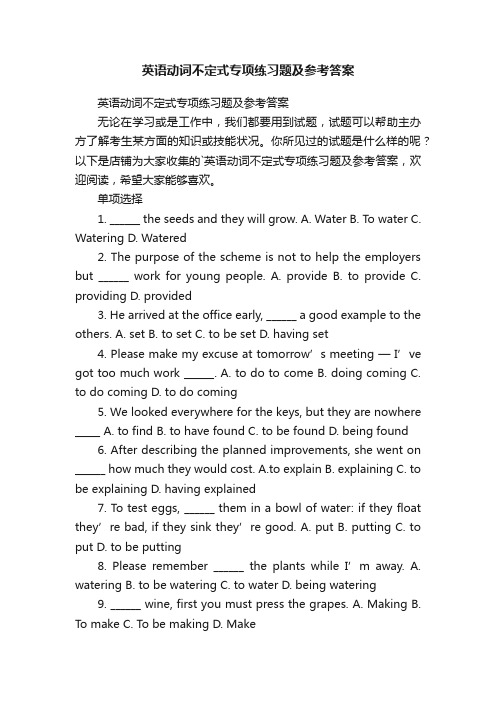
英语动词不定式专项练习题及参考答案英语动词不定式专项练习题及参考答案无论在学习或是工作中,我们都要用到试题,试题可以帮助主办方了解考生某方面的知识或技能状况。
你所见过的试题是什么样的呢?以下是店铺为大家收集的`英语动词不定式专项练习题及参考答案,欢迎阅读,希望大家能够喜欢。
单项选择1. ______ the seeds and they will grow. A. Water B. To water C. Watering D. Watered2. The purpose of the scheme is not to help the employers but ______ work for young people. A. provide B. to provide C. providing D. provided3. He arrived at the office early, ______ a good example to the others. A. set B. to set C. to be set D. having set4. Please make my excuse at tomorrow’s meeting —I’ve got too much work ______. A. to do to come B. doing coming C. to do coming D. to do coming5. We looked everywhere for the keys, but they are nowhere _____ A. to find B. to have found C. to be found D. being found6. After describing the planned improvements, she went on ______ how much they would cost. A.to explain B. explaining C. to be explaining D. having explained7. To test eggs, ______ them in a bowl of water: if they float they’re bad, if they sink they’re good. A. put B. putting C. to put D. to be putting8. Please remember ______ the plants while I’m away. A. watering B. to be watering C. to water D. being watering9. ______ wine, first you must press the grapes. A. Making B. To make C. T o be making D. Make10. I’ve never been so poor ______ able to afford a meal. A.as to be not B. not as to be C. as not to be D.as to not be11. I don’t know whether to stay in teaching or ____another job. A. trying getting B. to try to get C. trying to get D. try get12. I’ll have to change my clothes before I go out —I don’t want ______ like this. A. to see B. to be seeing C. to be seen D. being seen13. In fact, she was the first woman ______to such a post. A. to elect B. to be electing C. to have elected D. to have been elected14. I’d like ___over the Alps and looking down at the mountains. A. flying B. being flying C. to be flying D. be flying15. I’m learning ______ a cake. Can you explain ______ one?A. to make, to makeB. how to make, to makeC. to learn, how to makeD. making, making16. Whom would you rather _____ with you, Jim or Jack? A. have go B. have to go C. have gone D. has to go17. The husband advised ______to the south, but his wife advised him _____ up the idea. A. moving, giving B. to move, to give C. moving, to give D.to move, giving18. “Would you like to come for a walk with me?” “I’d prefer ___, thank you.” A. not to B. to not C. not D. can’t19. I would mend your radio, but I don’t know ______. A. howB. toC. how toD. to how20. “I haven’t heard from Henry for a long time.” “What do you suppose ______ to him?” A. was happening B. to happenC. has happenedD. had happened21. When I handed the report to John, he said that George was the person _____. A.to send B.for sending it C.to send it to D.for sending it to22. “Do you know the girl in red?” “She seems _____ me at last month’s party. But I’m not sure. A. to introduce to B. to be introduced to C. being introduced to D. to have been introduced to23. We all agreed ______ for another day, but Jim disagreed ____ A.to wait,to do so B.to wait,不填C.waiting, doing so D.waiting,不填24. He made up his mind to devote his life _____ pollution _____ happily. A. to prevent, to live B. to prevent, from living C. to preventing, to live D. to preventing, from living25. I wish I’d been there — I would like ____ her face when his husband came in. A. to see B. to have seen C. seeing D. having seen【参考答案】1—5 ABBAC 6—10 AACBC 11—15 BCDCC 16—20 ACACC 21—25 CDBCB英语动词短语有哪些put短语put out 熄灭;扑灭put off 推迟;脱掉put away 放好;收拾put down 记下;镇压put into 把……放进;使进入put on 穿上(戴上);上演;增加put up 张贴(广告等);挂起;举起look短语look at 看look for 寻找look after 照顾look over 检查look through 浏览look like 看起来像look up 查找;查询look out 留神;当心look around 向四周看look up to 尊敬look down upon 瞧不起;看低look forward to 期待;盼望get短语get up 起床get into 进入get lost 迷路get over 克服get away 逃离get down 下降get from 从……得到get on 穿上;上车;进展get back 返回;回来;回家get off 下车;脱下(衣服等)get along/on with sb. 与某人相处give短语give up 放弃give away 捐赠;颁发give back 还给;归还give birth to 生;产生give in 屈服;让步give out 分发;散发give sb. a lift 捎某人一程take短语take away 拿走take out 取出take on 呈现;雇佣take over 接收;接管take down 记下;取下take after (外貌或行为)像take in 吸入;吞入(体内)take off 脱下(衣服等);起飞take up 从事(工作、兴趣爱好等);着手处理take part in 参加……;参与……take care of 照顾,照料(=look after) take pride in 感到自豪(=be proud of) turn短语turn on 打开turn off 关掉turn out 结果是turn up 调高(声音)turn over 翻身;翻转turn down 调低(声音)turn around 转身;调头go短语go on 继续go away 走开go back 回去go out 出去;熄灭go along... 沿着……走go over 仔细检查;复习go through 浏览;翻阅;通过come短语come from 来自come into 进入come in 进入;进来come out 出来;出版come up 发生;提到come down 下落;下降come on 来吧;赶快;加油come back 回来;想起来come over 顺便来访;过来come across (偶然)遇见(或发现) come along 一道去;进行;进展come true (希望等)实现;达到come up with 追上;赶上;想出(主意);提出fall短语fall behind 落后fall asleep 入睡fall ill 患病;病倒fall down 倒下;滑倒fall into 掉进……里fall off 从……掉下来fall in love with 爱上cut短语cut in 插嘴cut up 切碎cut down 削减;砍倒cut off 切断;中断call短语call off 取消call on 号召;拜访call up 给......打电话call for 要求;需要pick短语pick up 捡起;接载pick out 挑选;取出高考英语考点:动词不定式1、一种情况为主语是不定式(表示条件),表语也是不定式(表示结果)To see is to believe/ To work means to earn a living.2、另一种情况主语是以aim, duty, hope, idea, happiness, job, plan, problem, purpose, thing, wish等为中心的名词,或以what引导的名词性从句,不定式表语对主语起补充说明作用His wish is to buy a luxurious car in the near future. / The boss's plan is to start building the skycraper immediately. / WhatI want to say is to get rid of the plan forever.1) The function of Louis Sullivan's architecture was providing[A] large uninterrupted floor areas [B] and to allow ample light[C] into the interior [D] .2) The most important [A] thing is negociate [B] with them about [C] the future of [D] the plant.3、因为不定式所修饰的名词是不定式的宾语,所以如果不定式动词是不及物动词,那么就要在动词后加上相应的介词He has a lot of trifles to deal with./ I had got no place to live in./That girl has nothing to worry about./the subject to concentrate on. / He has a strict teacher to listen to. / She has four children to look after. / She had a sick mother to live with. / This is the very person to sell your ticket to.1) Although the lecture had already been on for five minutes,I still was not able to find a chair .[A] to sit[B] for to sit on[C] to sit on[D] for sitting4、一些表示企图、努力、倾向、目的、愿望、打算、能力、意向等意义的名词后面要求接不定式作其定语,如:ability, attempt, effort等1) During [A] the 19th century scientists found [B] that when certain parts of the brain were damaged [C] men lost the ability doing [D] certain things.2) What is new, however, is the scientific attempt whether other planets beyond our own have given birth to advanced civilizations.[A] discover[B] discovers[C] discovering[D] to discover3) Surely her daughter would make an even bigger effort her?[A] please [B] pleased [C] to please [D] having pleased。
- 1、下载文档前请自行甄别文档内容的完整性,平台不提供额外的编辑、内容补充、找答案等附加服务。
- 2、"仅部分预览"的文档,不可在线预览部分如存在完整性等问题,可反馈申请退款(可完整预览的文档不适用该条件!)。
- 3、如文档侵犯您的权益,请联系客服反馈,我们会尽快为您处理(人工客服工作时间:9:00-18:30)。
英语语法(动词不定式)定义:动词不定式是一种非限制动词形式,即非谓语动词。
非限定动词是指不能单独在句中充当谓语的动词形式。
非谓语动词包括:动词不定式,-ing分词和-ed分词。
动词不定式在语法功能上可作主语、宾语、表语、定语和状语。
2.不定式的用法1)不定式结构作主语1. To see is to believe.2.To finish that task in such a short time is really a challenge.在上述情况下,如果不定式较长,显得头重脚轻,则可由it作形式主语,而将不定式放到后面。
如:1. It is really a challenge to finish that task in such a short time.2. It's… for sb to do.和It's … of sb to do.1)for sb. 句型中的形容词一般为表示事物的特征特点,表示客观形式的形容词,如easy, hard, difficult, interesting, impossible等:例如:It's very h ard for him to study two languages. 对他来说学两门外语是很难的。
2)of sb句型中的形容词一般为表示性格,品德,心智能力,表示主观感情或态度的形容词,如careless,clever,considerate,foolish,good,impolite,kind,naughty,nice,silly,stupid。
例如:It's very nice of you to help me. 你来帮助我,你真是太好了。
2)不定式作宾语不定式作宾语有两种:一种是及物动词后直接跟带to的不定式,另一种是“及物动词+疑问词+带to 的不定式。
及物动词+带to的不定式结构:只能跟动词不定式的动词,常见的有: afford,agree,aim,appear,ask,decide, demand,desire,determine,expect,fail,happen,hesitate,hope,intend,learn,long,manage,offer,pretend,promise,prepare,refuse,seek,swear,want,wish等。
1.He managed to solve the complicated problem.2.The stranger offered to show me the way.动词+疑问代(副)词+不定式:这类动词常见的有advise,decide,find out,forget,inquire,know,learn,see,remember,teach,tell,understand,wonder等。
常见的疑问代(副)词有: what,when,where,which,how,whether等。
1.He does not know when to start.2.You can decide whether to continue or to stop.3.I will show you how to deal with it.有时,不定式可由it代替,而把不定式放到后面去。
这可以用这一结构表达:动词(如find,think,consider,feel等)+it+ 形容词+不定式。
1.She considers it necessary to make friends with him.2.We find it difficult to finish all the homework before 9 o’clock.3)不定式做表语不定式可放在be动词后面,形成表语。
例如:1.To see is to believe.另一种情况为主语是以aim,duty,hope,idea,job,plan,problem,purpose,thin g,wish等名词为中心的短语,或以what引导的名词性从句,不定式表语对主语起补充说明作用:;例如:1.His aim is to study abroad in the near future.2.The most important thing is to negotiate with them about the price.3.What I want to say is to forget all the unhappy experience.4)不定式作定语第一种,被修饰的名词词组是不定式的逻辑宾语。
例如:1.There was really nothing to fear.2.He gave me an interesting book to read.如果不定式是不及物动词,后面就得加相应的介词。
例如:1.Mary needs a friend to play with.2.That girl has nothing to worry about.3.Although the film had been on for ten minutes,I still was not able to find a chair to sit on.第二种,被修饰的名词词组是不定式的逻辑主语;例如:1.Have you got a key to unlock the door?2.The action to be taken is correct.5)不定式作状语1)目的状语常用结构为to do , in order to do,so as to d o,so(such)… as to…(如此…以便…)。
例如:He ran so fast as to catch the first bus.他飞快地跑以便赶上第一班车。
I come here to say good-bye to you.我来是向你告别。
2)作结果状语,可以表示没有预料到的或事与愿违的结果,不定式要放在句子后面。
I awoke to find my truck gone. 我醒来发现箱子不见了。
He searched the room only to find nothing. 他搜索了房间,没发现什么。
3)表原因I'm glad to see you. 见到你很高兴。
She wept to see the sight. 她一看到这情形就哭了。
4)表示理由和条件He must be a fool to say so.You will do well to speak more carefully.不带to的不定式的使用动词不定式通常带to,但在有些搭配中不带to,在另一些搭配中可带to可不带to。
归纳起来,以下情况下使用不带to不定式:1) 在can/could,may/might,will/would,shall/should,must,need,dare等情态动词之后,动词不定式不带to。
2)在感官动词,如see,feel,watch,notice,smell,hear,observe等后,或使役动词,如have,let,make等后,动词不定式不带to。
例如:1.I often heard him say that he would study hard.2.I must have him see his own mistakes.但是,当这类结构转换为被动语态时,后面的不带to不定式一般转换为带to不定式。
例如:1.He was often heard to say that he would study hard.3)在动词help之后可用不带to的不定式,也可用带to的不定式。
例如:1.Help the old lady (to) carry the heavy box.4) 在had better,would rather,may/might as well最好还是,不妨,rather than,can not but不得不,等搭配之后,动词不定式也不带to。
例如:1.Unless you feel to ill to go out,I would rather not stay at home tonight.2.She could not but criticize his foolish behaviour.5)在介词but,except之后,如果其前有动词do的某种形式,其后不定式一般不带to,反之则必须带to,表示“不得不,只能”。
例如:1.He will do anything except work on the farm.2.There was nothing left for the enemy to do but surrender.3.I had no choice but to wait till it stopped raining.6)紧跟在why或why not之后的动词不定式总是不带to。
但是,紧跟在who,what,which,whether 等连接词后的不定式带to。
例如:Why stand up if you can sit down?Why not ask your teacher when you don't understand the meaning?You needn't decide yet whether to study arts or science.4.不定式的时态语态:(以to do为例)时态主动被动一般式To do To be done完成式To have done To have been done进行式To be doing完成进行式To have been doing1.She feels relaxed to have finished writing her thesis before the deadline.2.The Vikings are believed to have discovered America.3.When you called me last night, I happened to be working on the computer.4.The snow was supposed to have been blown off the mountain.不定式的否定形式否定形式是在不定式的标志to前加not。
例如:1.I decided not to ask him again.2.Please remember not to leave the lights on when you are out.I.单项选择:1. He seems ___ the old lady.A. knowingB. to be knowingC. to knowD. to be known2. Tom__when they spoke ill of him.A. happened to be passedB.happened to be passing byC. happened passing byD. happened to passed3. We all hope__ scientists.A. becomeB. to becomeC. becomingD. became4. The boy refused ____ for climbing the tall tree.A. to payB. to be paidC. being paidD. paying5. I happened ____ the article when he asked me about it.A. having readB. to have readC. to be readD. reading6. ___with him is a great pleasure.A. To talkB. TalkC. TalkedD. To talking7. It is nice _____ your voice.A. to hearB. hearC. heardD. to be hearing8. ___is to struggle. A. Living B. Live C. To live D. To be lived9. Her wish is ____ a doctor.A. becomingB. becomeC. to becomeD. being come10. I was just about ___the office when the phone rang.A. leavingB. leaveC. to leaveD. to leaving11. I didn’t ___it until you had explained how.A. manage to doB. managed to doC. manage to have doneD. manage doing12. He found it important ___ the situation all over the world.A. studyB. to studyC. studiesD. to be studied13. At last the enemy soldiers had no choice but ___ their guns.A. to lay downB. lie downC. laying downD. lay down14. Yesterday I did nothing but ___ TV.A. watchB. watchedC. to watchD. watching15. It had no effect except ___ him angry.A. makeB. makingC. to makeD. made16. Bob did nothing except __ tennis.A. playB. to playC. playingD. played17. I’m considering ___ his letter.A. to answerB. how answeringC. to be answeringD. how to answer18. Tell us _____ next. A. how to do B. what to do C. how do D. what do19. We want to know ___ to help him when he is in trouble.A. what will doB. what we should doC. how to doD. what will we do20. Don’t stop trying. You’ll be sure ___ .A. succeed B . succeeding C. of succeeding D. to succeed 1-20 CBBAB AACCC ABAAC ADBBD。
